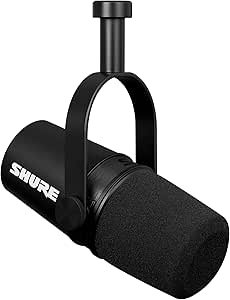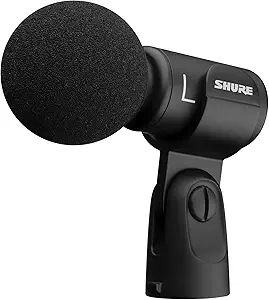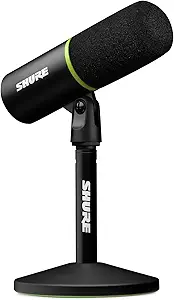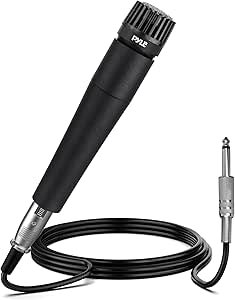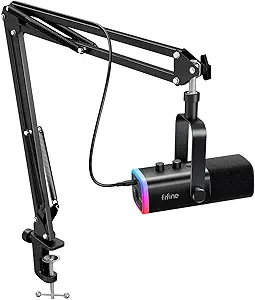Shure MV7X Microphone review for podcasting and vocals with pro dynamic sound quality
Shure MV7X Microphone review for podcasting and vocals with pro dynamic sound quality
- Voice isolation technology ensures clear audio by focusing solely on the speaker’s voice and blocking background noise.
- The rugged all-metal construction provides exceptional durability, making it suitable for frequent use in various settings.
- Its adjustable yoke design allows for effortless attachment to different microphone stands, enhancing flexibility in positioning.
- Optimized audio quality delivers a balanced, professional-grade tone ideal for both podcasting and vocal recording.
- XLR connection compatibility ensures seamless integration with professional audio interfaces, eliminating the need for additional pre-amps.
As an Amazon Associate I earn from qualifying purchases.
Description
Introduction to the Shure MV7X Microphone
Testing the Shure MV7X Microphone, I was immediately drawn to its sleek all-metal construction and voice-isolation technology. As someone who dabbles heavily in podcasting and vocal recording, a reliable and professional XLR dynamic microphone is an absolute must in my setup. This microphone, designed specifically for podcasters and vocalists, promises high-quality audio without capturing unwanted background noise. Does it deliver? Let me share my experience.
Design and Build Quality
The all-metal construction of this microphone feels incredibly durable and premium. I’ve used microphones in the past that felt flimsy or prone to wear and tear, yet the Shure MV7X exudes a level of sturdiness that speaks to its professional-grade design. The adjustable yoke, which can attach to a variety of mic stands, is not only convenient but also ensures a secure fit during long recording sessions. I’ve paired it with both a standard mic stand and a boom arm, and the compatibility is seamless thanks to the included 5/8” to 3/8” thread adapter.
The microphone is also surprisingly compact when compared to others in its league. Despite its large diaphragm form factor, it doesn’t dominate my desk or recording space. This was a welcome bonus since I record in a relatively cramped setup.
Voice-Isolation Technology
The voice-isolation technology is where this microphone truly shines. This feature ensures that my voice is the focal point of the recording, minimizing background noise effectively. I tested it in a variety of environments, including a moderately noisy room with a fan running in the background, and the results were impressive. The mic’s cardioid pick-up pattern and dynamic cartridge seem to work together beautifully to reject unwanted noise while keeping the audio crisp and focused.
For podcasters like myself, this is a game-changer. It allows me to record without worrying about external disturbances ruining the quality. Even in less-than-perfect acoustic settings, the microphone delivers professional-level results.
Performance and Audio Quality
In terms of performance, the frequency range of 50-16,000 Hz provides a balanced tone that works well for both podcasting and vocal recording. I tested it with different voices—mine and a co-host’s—and it captured nuances exceptionally well. The signal-to-noise ratio of 72 dB ensures clarity and reduces the hiss or fuzz that some other microphones might pick up.
One thing I noticed is that the XLR output is incredibly reliable. Unlike USB microphones, which often face latency issues, the XLR connection here ensures a seamless experience when paired with an audio interface. I plugged it into my mixer, and the sound was rich, warm, and true to life.
Key Benefits
- Professional-grade build: The all-metal design ensures durability and longevity.
- Voice isolation technology: Your voice becomes the star, even in noisy environments.
- Seamless XLR connection: Perfect for professional interfaces with no need for an in-line pre-amp.
- Flexible placement options: Compatible with various mic stands and boom arms.
Areas for Improvement
Despite its many strengths, there are a few caveats to consider:
- No USB option: This is strictly an XLR microphone, so those without an audio interface might find it limiting.
- Price point: While it’s worth the investment for professionals, it may not be the most budget-friendly for beginners.
- Lack of bundled accessories: You’ll need to purchase a pop filter or windscreen separately, which some competitors include.
Competing Products
When comparing the Shure MV7X to its market rivals, the legendary Shure SM7B comes to mind immediately. While the MV7X is modeled after the SM7B, it lacks the USB connectivity option and flat frequency response switches that the SM7B offers. That said, the MV7X is significantly more affordable and delivers comparable audio quality for podcasting purposes.
Another competitor is the Audio-Technica AT2020, which is also an XLR microphone. The AT2020 offers a slightly wider frequency range but doesn’t include voice-isolation technology, making it less suitable for noisy environments. If you’re choosing between the two, the Shure MV7X wins on noise rejection and build quality.
For those on a tighter budget, the Samson Q2U provides both USB and XLR connectivity, making it a versatile choice. However, its sound quality and durability do not match the professional-grade performance of the MV7X.
Value for Money
Considering the features and performance, the Shure MV7X offers excellent value for its price. While it may not be the most budget-friendly option on the market, the quality for price is undeniable. The microphone is clearly aimed at professionals or serious hobbyists who want to elevate their recordings without breaking the bank. Its voice-isolation technology, combined with its rugged build, makes it a worthy investment for podcasters, vocalists, and content creators alike.
If you’re looking to build a cost-effective yet professional setup, this microphone is a fantastic starting point. The lack of USB connectivity might deter some users, but for those already equipped with an audio interface, the Shure MV7X is a true value contender.
Final Thoughts on the Shure MV7X
While I’ve tested many microphones over the years, the Shure MV7X stands out for its attention to detail and performance-focused design. Whether you’re recording in a home studio, a shared space, or a less-than-ideal acoustic environment, the voice-isolation technology ensures your recordings are crisp, clear, and professional. If you’re ready to take your podcasts or vocal recordings to the next level, this microphone is undoubtedly worth considering.
Additional information
| Audio Sensitivity | 38 dB |
|---|---|
| Item Weight | 1.12 pounds |
| Maximum Frequency | 16 KHz |
| Microphone Form Factor | Large Diaphragm |
| Minimum Frequency | 50 Hz |
| Item dimensions L x W x H | 4.92 x 4.33 x 10.83 inches |
| Power Source | Corded Electric |
| Material | Metal or Sturdy Plastic |
| SignaltoNoise Ratio | 72 dB |
| Hardware Platform | Audio Interfaces & Mixers |
| Number of Channels | 1 |
| Frequency Range | 50-16000 hertz |
| Frequency Response | 16 KHz |
| Manufacturer | Shure |
| UPC | 042406738071 |
| Product Dimensions | 4.92 x 4.33 x 10.83 inches |
| Country of Origin | China |
| Item model number | MV7X |
| Is Discontinued By Manufacturer | No |
| Color Name | Black |
| Material Type | Metal or Sturdy Plastic |
| RAM Size | 512 GB |
